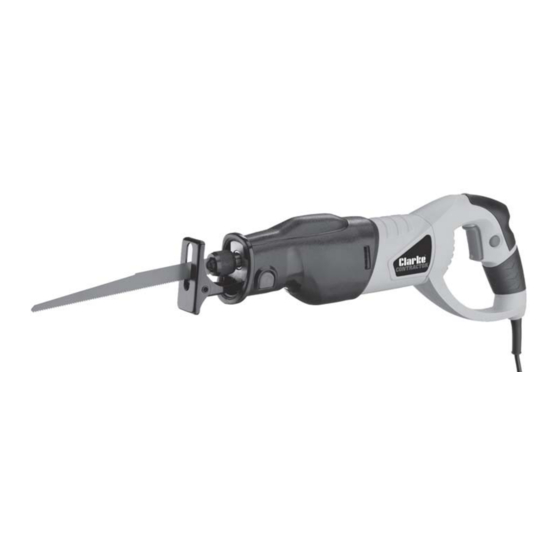
Summary of Contents for Clarke CONTRACTOR CON850
- Page 1 850W RECIPROCATING SAW Model No. CON850 PART NO: 6459010 OPERATING & MAINTENANCE INSTRUCTIONS GC01/12...
-
Page 2: Introduction
INTRODUCTION Thank you for purchasing this CLARKE Reciprocating Saw. Before attempting to use the machine, please read this manual thoroughly and follow the instructions carefully. In doing so you will ensure the safety of yourself and that of others around you, and you can look forward to your purchase giving you long and satisfactory service. -
Page 3: Table Of Contents
TABLE OF CONTENTS INTRODUCTION .................. 2 GUARANTEE ..................2 ENVIRONMENTAL PROTECTION ............2 TABLE OF CONTENTS ................3 GENERAL SAFETY RULES ..............4 RECIPROCATING SAW SAFETY INSTRUCTIONS ........6 ELECTRICAL CONNECTIONS .............. 7 OVERVIEW ..................8 BEFORE USE ..................9 INSTALLING/CHANGING BLADES ............ -
Page 4: General Safety Rules
GENERAL SAFETY RULES WORK AREA 1. Keep the work area clean and well lit. Cluttered and dark areas invite accidents. 2. Do not operate power tools in explosive atmospheres such as in the presence of flammable liquids, gasses or dust. Power tools create sparks which may ignite dust or fumes. - Page 5 5. Dress properly. Do not wear loose clothing or jewellery which may get caught in moving parts. Wear protective hair covering to contain long hair. For best footing, wear rubber soled footwear. Keep floor clear of oil, scrap wood, etc. 6.
-
Page 6: Reciprocating Saw Safety Instructions
3. Use the appropriate saw blade for the material being cut. Different blades are available from your Clarke dealer. 4. Only use saw blades in perfect working condition. Discard and replace any cracked or bent saw blades. -
Page 7: Electrical Connections
ELECTRICAL CONNECTIONS WARNING! Read these electrical safety instructions thoroughly before connecting the product to the mains supply. Before switching the product on, make sure that the voltage of your electricity supply is the same as that indicated on the rating plate. This product is designed to operate on 230VAC 50Hz. -
Page 8: Overview
OVERVIEW The CLARKE CON850 is a variable-speed reciprocating saw fitted with a lock- on button for continuous operation. The saw is equipped with a quick-release blade retention system for convenient replacement of saw blades. When unpacking, check for damage or shortages etc. Any found should be reported to your CLARKE dealer where the appliance was originally purchased. -
Page 9: Before Use
BEFORE USE CAUTION: USE ONLY RECIPROCATING SAW BLADES WITH THE CORRECT FITTING AS SHOWN IN FIG 1. ALWAYS ENSURE THE SAW IS DISCONNECTED FROM THE POWER SUPPLY BEFORE INSTALLING/REMOVING THE BLADE. INSTALLING/CHANGING BLADES Fig 1 1. Hold the reciprocating saw as shown in fig 2. -
Page 10: Operation
OPERATION IMPORTANT: DO NOT plug in to the mains, unless you have ensured the saw is switched OFF. To do this, squeeze the trigger fully, then release it. PRIOR TO CUTTING 1. Ensure that the workpiece is securely held in place and that the cut line is clearly marked. -
Page 11: Cutting Different Materials
4. Take extra care when cutting curves - move slowly to avoid stress on the blade. 5. Avoid putting unnecessary pressure on the blade and avoid applying lateral pressure. Let the blade work naturally. 6. Never try to start the tool if the blade becomes jammed in the workpiece. 7. -
Page 12: Fault Finding
FAULT FINDING l l i . y l f i t e i l y l l f i t . y l MAINTENANCE CLEANING 1. To ensure constant air circulation, always keep air vents clear of blockages, (use compressed air to clean the machine if possible). 2. -
Page 13: General Maintenance
SPECIFICATION Please note that the details and specifications contained herein, are correct at the time of going to print. However, CLARKE International reserve the right to change specifications at any time without prior notice. Parts & Service: 020 8988 7400/E-mail:Parts@clarkeinternational.com or Service@clarkeinternational.com... -
Page 14: Parts Diagaram/List
PARTS DIAGRAM Parts & Service: 020 8988 7400/E-mail:Parts@clarkeinternational.com or Service@clarkeinternational.com... -
Page 15: Parts List
PARTS LIST n i l Parts & Service: 020 8988 7400/E-mail:Parts@clarkeinternational.com or Service@clarkeinternational.com... -
Page 16: Consumable Spare Parts
PARTS LIST & CONSUMABLE SPARE PARTS Replacement saw blades for wood and metal are available from your CLARKE dealer. Replacement Blades (5 per pack) • Logs/rough wood:- Part no: 6462027 • Prepared timber:- Part No: 6462028 • Metal:- Part no: 6462029... -
Page 17: Vibration Emissions
‘K’, which represents the uncertainty factor, i.e. a value in excess of ‘a’, to which the tool could vibrate under normal conditions. These values appear in the specification panel below. MODEL No: CON850 DESCRIPTION: RECIPROCATING SAW Declared vibration emission value in accordance... - Page 18 You will note that a third value is given in the specification - the highest measured reading in a single plane. This is the maximum level of vibration measured during testing in one of the axes, and this should also be taken into account when making a risk assessment.
-
Page 19: Declaration Of Conformity
DECLARATION OF CONFORMITY Parts & Service: 020 8988 7400/E-mail:Parts@clarkeinternational.com or Service@clarkeinternational.com...















Need help?
Do you have a question about the CONTRACTOR CON850 and is the answer not in the manual?
Questions and answers